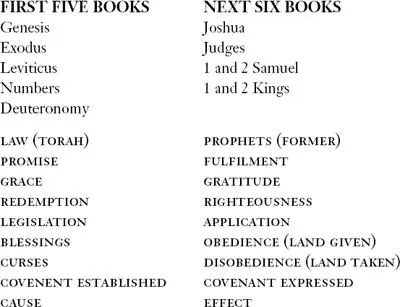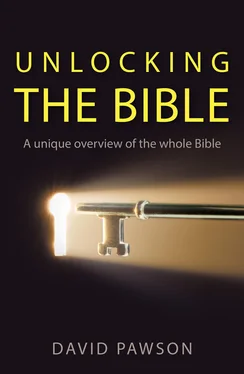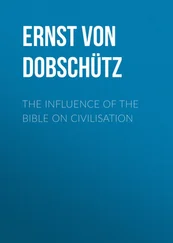The chart below shows the contrast between the books of the ‘former prophets’ and the books of the law.

There are a number of things to note from this chart.
1 The law includes God’s promises to Israel. The former prophets describe how these promises were fulfilled.
2 The law is God’s grace expressed to the people. The former prophets show how the people responded in gratitude to what they heard (although, as we will see, this gratitude was often sadly lacking).
3 The books of the law describe God’s redemption of his people from Egypt (Exodus). The former prophets explain how the people were to respond to God’s initiative by living in righteousness.
4 The books of the law tell how God would bless obedience and punish disobedience. In Joshua we see how an obedient response led to victory, as in the battle of Jericho. Conversely, we also see the ramifications of disobedience to the law, as in the defeat at Ai. Continued disobedience meant that the land claimed in the book of Joshua was taken away in 2 Kings.
The former prophets tell the tragic story of how the people won the Promised Land through obedience to the law, but then forfeited it because of disobedience. To put it another way: the first five books are the cause and the next six books the effect.
How should we read Joshua?
Before focusing on the book of Joshua itself we need to deal with the scholarly debate which can undermine our reading of so much biblical history. Many scholars argue that biblical truth is not historical or scientific but moral and religious. They are quite happy to accept that miraculous events form part of the Bible – just as long as no one is expected to believe that they actually took place! They suggest that biblical history is ‘myth’ or ‘legend’, teaching spiritual truths or values but not describing actual events which took place.
We need not deny that parts of the Bible are fictional. Jesus’ parables are technically ‘myths’. It does not matter whether there was an actual prodigal son or not, since the purpose of the story was to communicate important truth to the hearers. However, admitting that the Bible contains stories is a long way from agreeing that events included in the Bible are fiction.
Questioning the truth of the Bible began in the nineteenth century, when scholars argued that Adam and Eve were not real people but mythological figures whose activities explain universal truths. They said that the Fall was not the entrance of sin into the world, with a real Adam and Eve eating fruit prohibited by God, but a story showing the universal truth that if you tell someone not to touch something, they will want to touch it!
This approach did not stop with the story of Adam and Eve. Noah’s ark was next and eventually there were few biblical events which escaped this type of scrutiny. After this we were apparently left with a kind of biblical version of Aesop’s Fables, which conveys spiritual truth but has minimal historical basis.
The process of reading the Bible from this standpoint was given a long name: demythologization. Put simply, this means that in order to obtain the truth, one must discard the story (myth), and with it any suggestion that the story is based on historical fact. Miraculous or supernatural elements can therefore be discarded as being part of the myth.
This demythologization did not stop with the Old Testament: the New Testament was also attacked. The virgin birth, the miracles and the resurrection were regarded as soft targets. This scholarly debate affected theological training, and before long there were church leaders who taught that it did not matter whether the resurrection actually took place, providing people believed that it did. They said that if Jesus’ bones did still lie rotting in Israel, it made no difference to our ‘faith’.
With this background in mind, it is no surprise to find that concerns have been raised regarding elements of the book of Joshua, not least the story of the fall of Jericho. Scholars reasoned that the miracles in the story could not be accepted as fact by readers in a sophisticated scientific age. They saw it instead merely as a tale teaching us that God wants us to win our battles.
However, demythologizing Joshua requires much of the book to be cut out, for there are many apparent myths within the book: the Jordan river dries up, the Jericho walls collapse, hailstones help win a battle, and the sun and moon stand still for a whole day.
How do we respond to such an attempt to undermine the historical value of Joshua?
1 If we were to accept that miracles do not happen, we would be left with a purely human history, with little or no spiritual benefit. God’s part would be totally excluded. The ‘values’ or ‘truths’ would be of no more value than the sort of lessons gleaned, for example, from the secular history of China.
2 Mythical writings invent places and people to distinguish the genre from proper history, but biblical history is completely different. Joshua includes real places we can visit today: the River Jordan, Jericho and Jerusalem. It also includes real people groups, which secular historians acknowledge existed at this time: the Canaanites and the Israelites.
3 Joshua claims to be written by contemporary eyewitnesses. The first person plural ‘we’ is used, for the writers were reflecting on events they had seen. Furthermore, a common phrase in the text is ‘to this day’. Contemporaries of the writer could check out the details. This is not a fable about mythical characters, but a sequence of historical events described by people who were there.
4 Archaeologists confirm a great deal of information given in Joshua. They have discovered that the entire culture of some of the cities included in the book changed over a 50-year period. There is evidence that cities such as Hazor, Bethel and Lachish were destroyed between 1250 and 1200 BC and the inhabitants reverted to a far simpler lifestyle. The date of this change fits with Joshua’s account of how these cities were conquered.
5 Those who question the miraculous events in Joshua ignore the fact that the events in themselves are not necessarily miraculous. It is no problem for us to accept the miraculous, but it is interesting to note that such phenomena can be explained. For example, the River Jordan dries up during floods even today. The river meanders through the Jordan Valley and, because of the flood conditions, undercuts the banks on the curve. These banks can be so undercut that they collapse, causing the river to dam itself, sometimes for up to five hours. Similarly, in modern times, we know that large buildings collapse. Cathedrals and skyscrapers have fallen in the same manner as the walls described in Joshua. It is not the events that are miraculous so much as the timing. The river dries up and the walls fall just when God said they would.
6 We have noted already that the Bible is not the history of Israel as such, for there is much that is excluded. Joshua covers 40 years, yet most of what happened in those 40 years is not recorded. The fall of Jericho fills about three chapters, which is out of all proportion if this is a history of Israel. It is really the history of what the God of Israel did. The writer records the periods when God was at work, for he is a living God, active in time and history, saying and doing things. If God had not intervened on their behalf, the Israelites would never have got the Promised Land. It was an impossible task for a bunch of ex-slaves with no military training to go in and take a well-fortified land and replace a culture that was far superior to theirs in humanistic terms. If the subject of the book is God’s activity, therefore, it should be no surprise when his work is beyond human understanding. If we seek to remove these parts of the story, or to ‘demythologize’ them, we undermine the whole nature and purpose of the book.
Читать дальше












